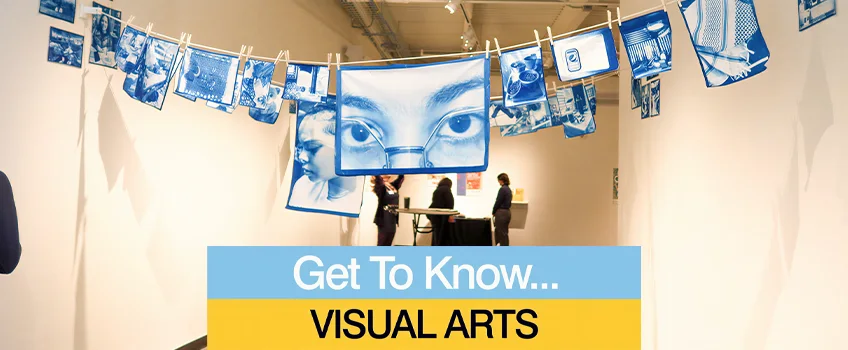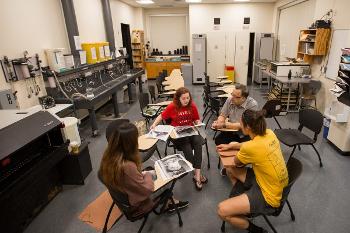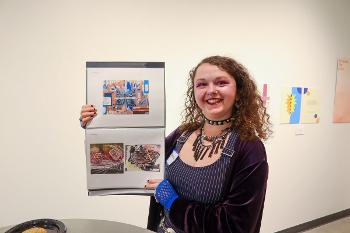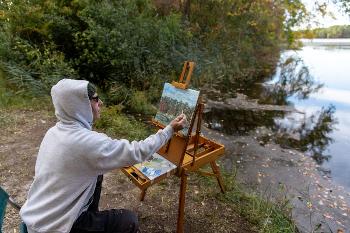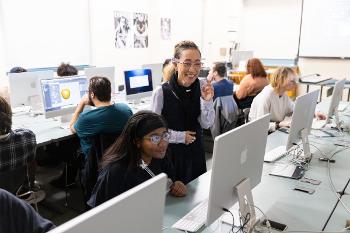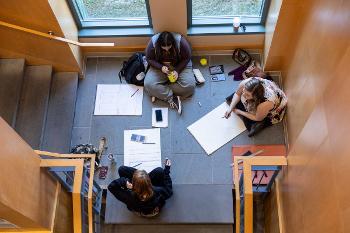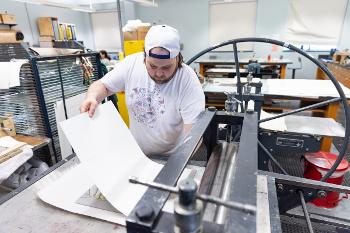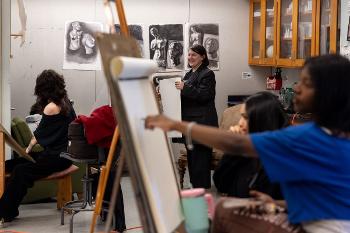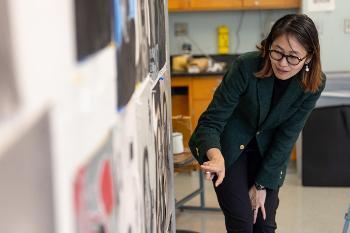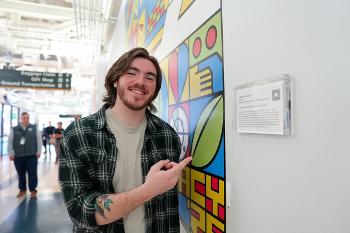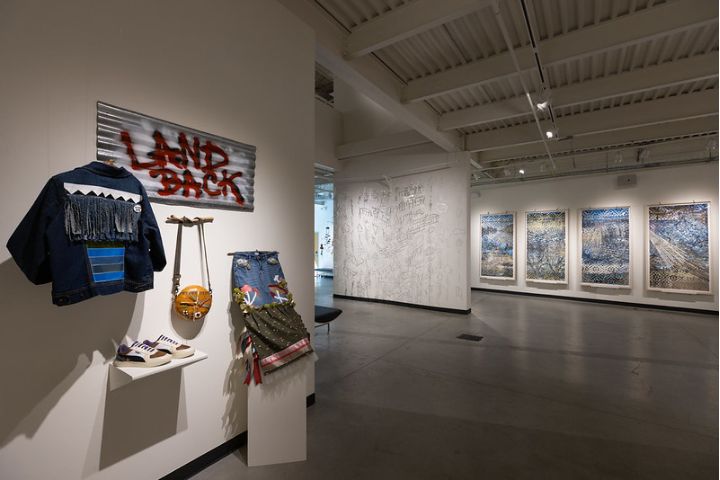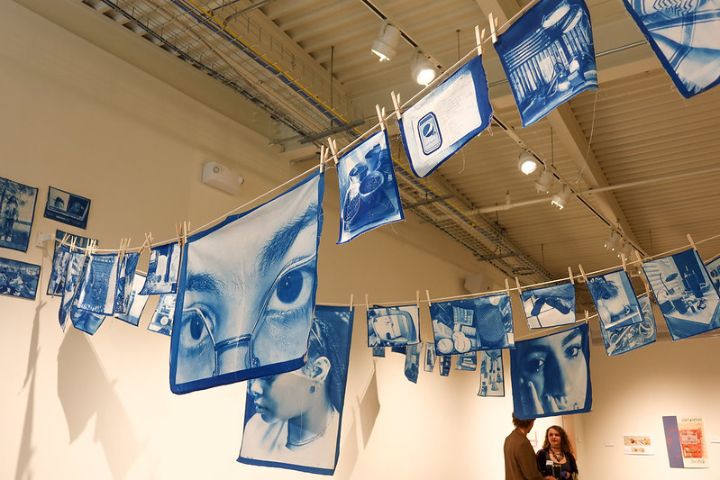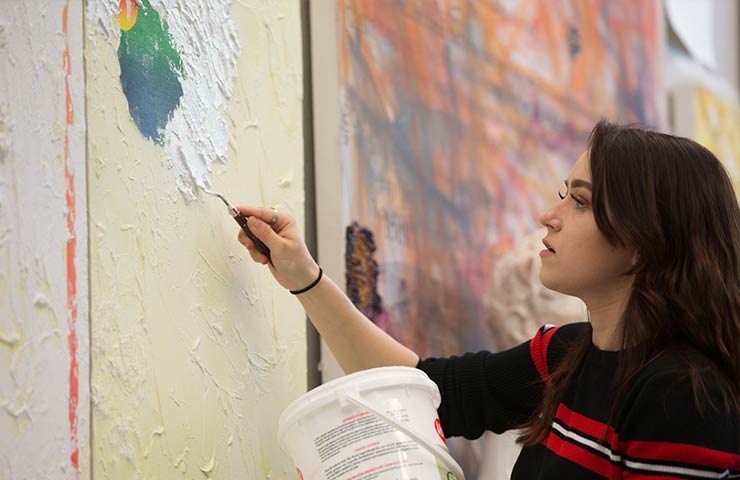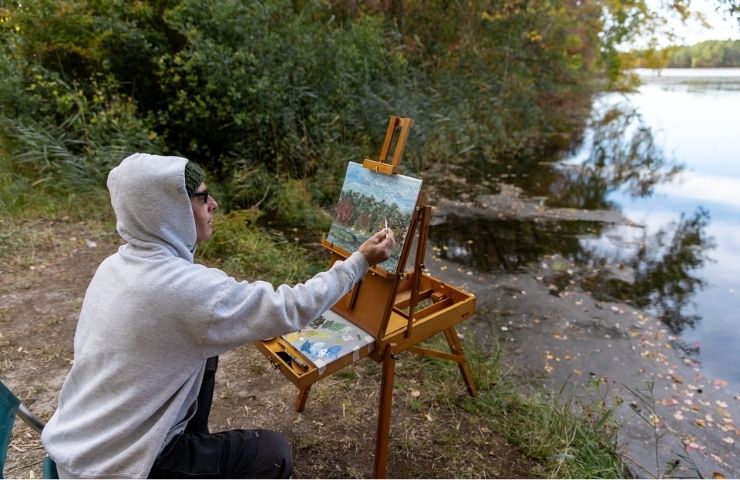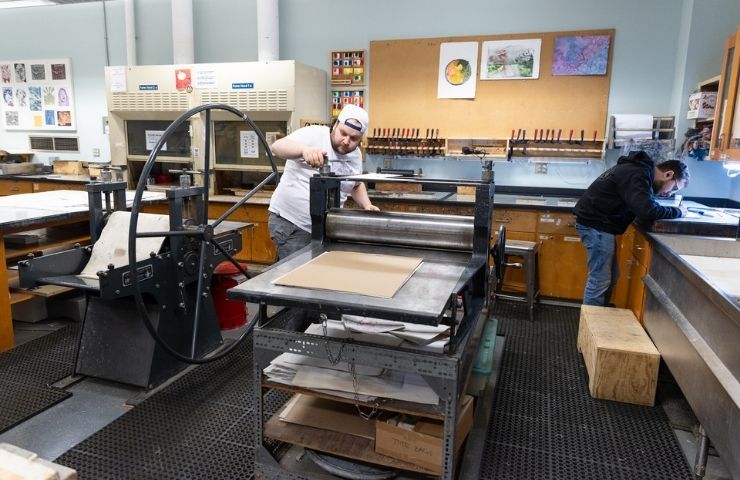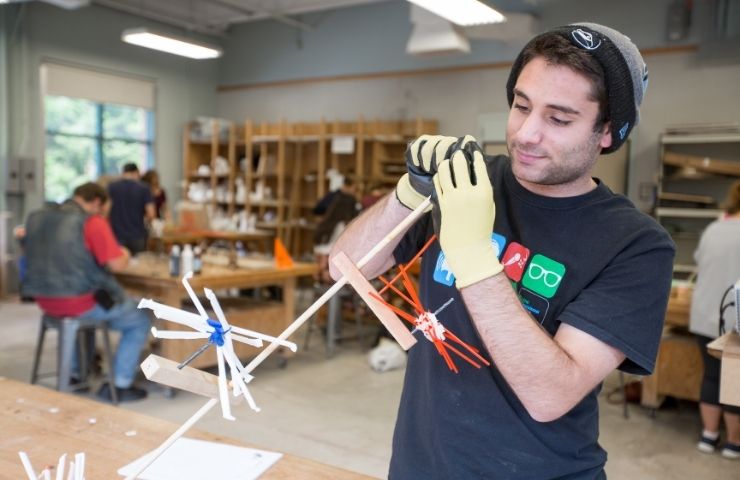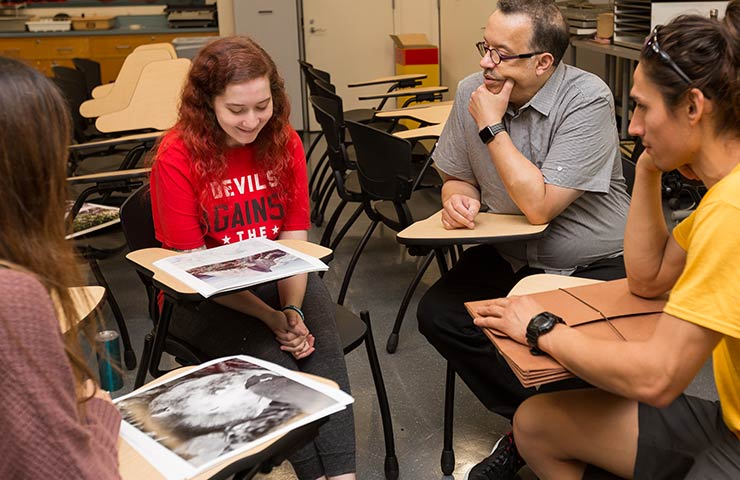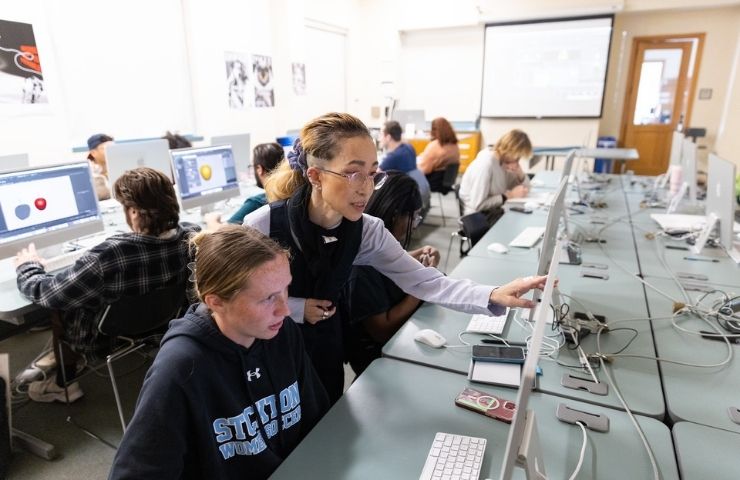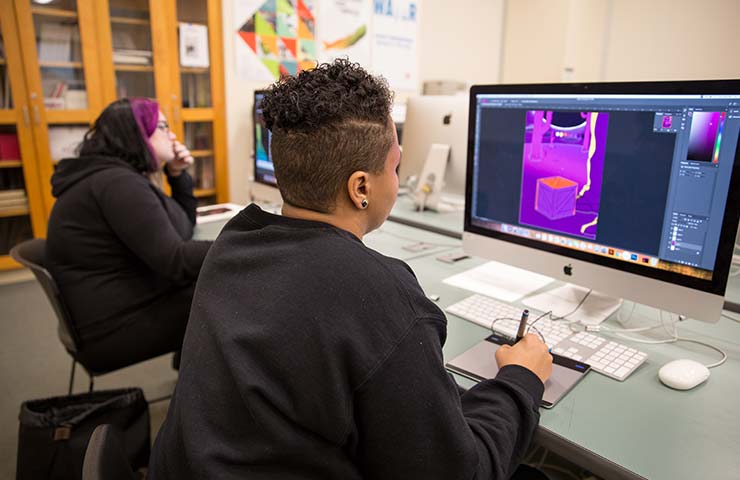Visual Arts Program
Grow as an artist and thinker in Stockton’s Visual Arts program, where small classes, dedicated studios, and mentorship from practicing artists help you build a professional portfolio for internships, exhibitions, and creative careers.
Study across digital media, drawing, painting, printmaking, photography, and sculpture, with options to pursue the BFA in Studio Art or BA pathways that connect you to South Jersey’s vibrant arts network, including opportunities with the Noyes Museum of Art and regional partners
About the Program
The Visual Arts program prepares students for careers as artists, graphic designers, photographers, illustrators, and fabricators, as well as careers in education, business, galleries and museums, and not-for-profit organizations.
The B.A. in Interdisciplinary Visual Arts or Art History, or Visual Arts K-12 Teacher Education, or the BFA in Studio Art, is also the first step for students interested in graduate study in art or art history. Visual Arts students are constantly pushed to develop their critical thinking and creative problem-solving skills, which are consistently listed among the skills Fortune 500 companies desire most.
The successes of our alumni are the best evidence of the quality of our program! Graduates of the Stockton Visual Arts program have attended top-ranked graduate programs and gone on to successful careers as photographers, graphic designers, illustrators, and in museums and galleries around the county.
Within the Visual Arts program you can pursue a:
B.A. degree in:
- Interdisciplinary Visual Arts;
- Art Teacher Certification for K-12;
- Art History
B.F.A. (Bachelor of Fine Arts) degree in Studio Art.
Students in the BFA select a concentration from:
- Illustration
- Photography
- Studio Art (painting, printmaking, sculpture);
- Graphic design (Visual Communications).
Minors in Art History and Studio Art are also available.
Our Mission
The mission of the visual arts program is to help students acquire the skills and conceptual framework necessary for the expression of ideas in art, design and art history, and to help them develop the basis for a lifelong pursuit of creative activity.
Student Testimonials
I majored in Visual Communications, as well as Art Education during my time at Stockton College. I chose Stockton College to further my art education after touring the Arts and Sciences building. I liked that Stockton had many different new art studios to work in, including photography, painting, computer labs and a sculpture studio. Stockton also provides extra studio time to students outside of regular class time. In addition to the Arts program, the Education program at Stockton is very well known in New Jersey for producing highly skilled, qualified teachers. I heard great things about the professors who teach at Stockton, so I knew it was the right fit for me.

B.F.A. - Visual Communications Concentration
I chose Stockton because I was looking for a strong graphic design program, but also wanted an intimate class size. A mentor at my community college recommended Stockton, and I really liked the atmosphere of the campus after a tour. While attending Stockton all of my professors knew who I was, and where I was in their courses. At Stockton you'll never feel like you are being pushed through a program as a number or a statistic. I really value the relationships I built with my professors while I attended Stockton and still keep in contact with many of them today.

B.F.A. - Visual Communications Concentration
I was a Visual Arts major, and my concentration was on sculpture. Stockton was very highly recommended to me by some friends who had attended. I will admit that as a non-traditional (older) student, I was hesitant to begin my college career. But once I met my professors and began my classes, I knew I was in the right place! I’m so thankful for the time I got to spend with all of them.

B.F.A. - Sculpture Concentration
Accreditation
The Bachelor of Arts Degree (BA)
The Bachelor of Arts Degree (BA) is offered through the Visual Arts Program. While completing the Core Curriculum, students select a BA concentration in Art History, Interdisciplinary Visual Arts (VIBA), or Visual Arts K-12 Teacher Certification (EDVA).
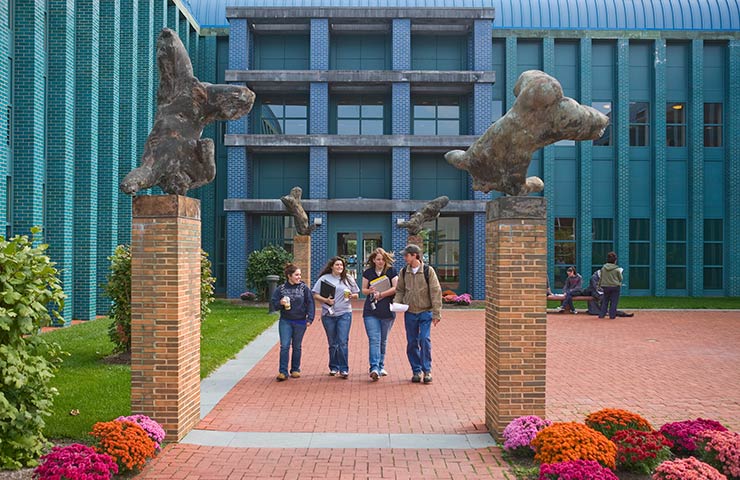
Concentrations:
Interdisciplinary Studio Art (VIBA)is a general studio arts degree in the Visual Arts with flexible course selection. The one-semester capstone (Senior Project) culminates in a project portfolio developed by the individual student.
Art History is the academic discipline that studies the history and development of the visual
arts, including architecture, painting, photography, prints, sculpture, and other
media.
The discipline is a useful supporting field for students of the visual arts, history,
literature, languages, psychology, philosophy, religion, and other disciplines.
The careers most directly related to Art History are in the curatorial, education,
and administrative departments of art museums, galleries, and arts non-profits.
Art history majors have found employment in fields as varied as teaching, interior
design, antiques, architecture, fashion, writing, editing, and publishing.
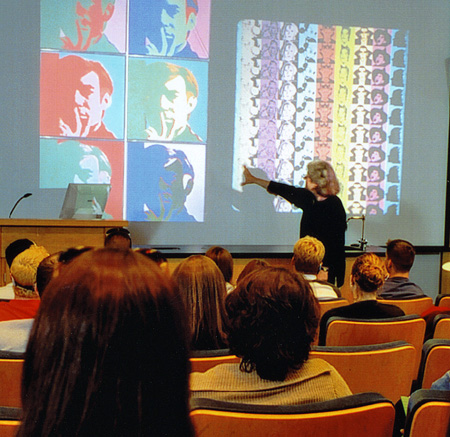
Visual Arts K-12 Teacher Certification (EDVA) is designed for students to earn a B.A. in Visual Arts with Teacher Certification. In this concentration, students take extensive courses in Visual Arts and in the School of Education, leading to certification to teach art at the primary and secondary level. Courses in drawing, painting, and sculpture are emphasized, with courses in digital design and illustration available. In the final year of the degree, students complete a practicum with a placement in K-12 classroom environments.
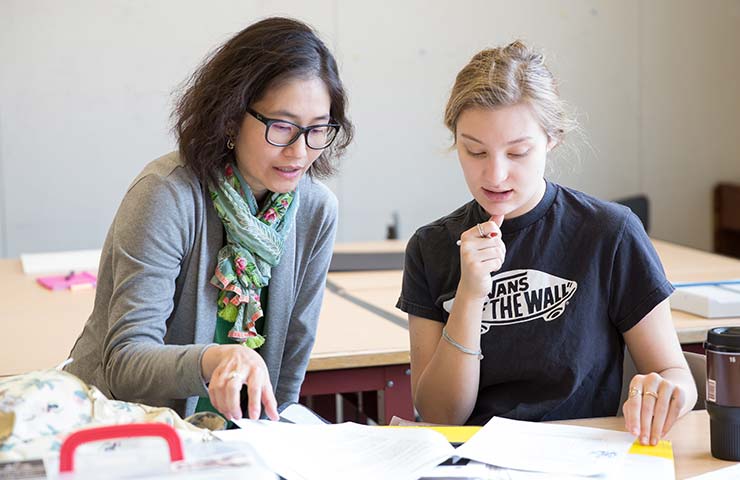
Curriculum
Click here for information about Portfolio Submission for VIBA and EDVA.
To view the curriculum, you’ll use the web program, Degree Works. This program is accessible even if you are not currently a student with Stockton University.
Current Students
Access your portal for Degree Works, then look for the “what if” option to explore the various paths towards degree completion. Click the button below for instructional videos on how to use Degree Works:
Prospective Students
Use the button below:
How to Use Degree Works Equivalency:
- At the next page you are prompted with three (3) options. Select the one that says “continue without signing in.”
- Respond to each prompt using the pull-down menu in the center of the page. [Please be patient. It may take a few seconds for the system to process your request. If you see a NO symbol, you need to wait a moment!]
Prompts include:
- Enrollment dates (Choose intended semester attending)
- Intended level (Choose “undergraduate”)
- What degree you will pursue? (Choose “Bachelor of Arts”)
- What is your intended major? (Choose “Visual Arts”)
- What is your intended concentration? (Choose from one of the concentrations listed below)
- What is your intended minor? (Choose “none” or select one - it is not required).
- For prospective students, choose “I’m all done" button.
- For transfer students, use the “class” button to see how courses already taken fit into the Stockton degree path.
- You will see an overview of the degree you have selected, including all requirements.
- At the bottom of the screen, you could save or print the worksheet.
The Bachelor of Fine Art Degree (BFA)
The Bachelor of Fine Art Degree (BFA) is offered through the Visual Arts Program. While completing the Core Curriculum, students select a BFA concentration in Illustration, Photography, Studio Art, or Visual Communications (graphic design).
The BFA offers depth in a discipline, more intensive studio experience, the knowledge and technical skill set fundamental to a discipline, and preparation for a career in the visual arts. In the two-semester capstone (Senior Project I and II) courses, faculty work closely with individual students to develop an individual portfolio of work made to professional standards, preparing them to apply to the graduate programs or pursue a career in the creative fields. The BFA culminates in a Senior Project Degree Exhibition in the Stockton Art Gallery.
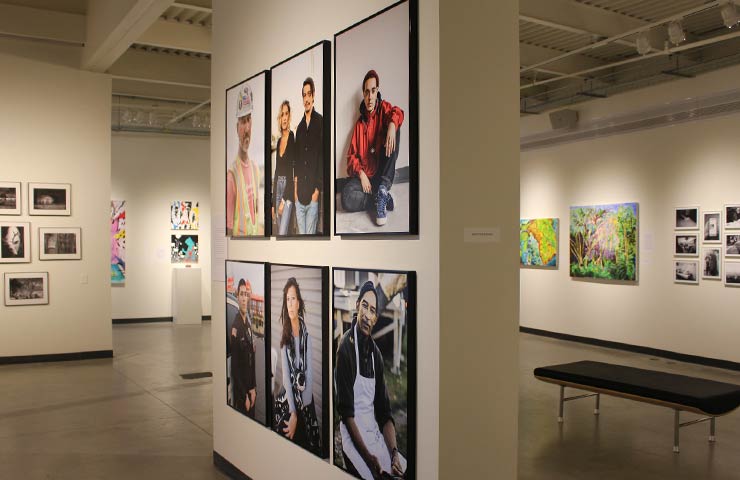
Concentrations:
Studio Art is a concentration in the BFA in Visual Arts that emphasizes artmaking in traditional
art disciplines and interdisciplinary art practice. Students have the opportunity
to select one or more areas of emphasis in painting, printmaking, or sculpture.
Painting at Stockton embraces everything from historical methods in oil to a variety of contemporary
media. Coursework varies considerably: in observational courses, students paint the
lakes and woods of the Galloway campus, along with the figure and numerous traditional
subjects. Other courses emphasize possibilities with material experimentation, abstraction,
and personal thematic exploration. Students in painting develop critical thinking
abilities, problem-solving, and visual thinking that have taken them into a variety
of creative fields.
Printmaking is an artistic process that allows artists to make multiple original works of art
by transferring images from a matrix onto another surface, most often paper or fabric.
Printmaking techniques include intaglio, lithography, relief, and silkscreen.
Contemporary printmaking is a vibrant field where students experiment with digital
technologies, renew traditional techniques, and work with alternative materials and
tools like laser cutters and non-toxic photopolymer intaglio. This concentration applies
to a variety of careers, including teaching, graphic design, illustration, and arts
management.
e on in a variety of careers, including teaching, graphic design, and arts management.
Sculptureis the creation of art in three-dimensional space. Sculpture can include almost any
medium, any process, and any form. A figure modeled, carved in marble is sculpture,
but so is a room filled with motor oil, or a life-sized whale skeleton made of plastic
lawn chairs. As a result, sculpture students are invited to experiment with a wide
range of materials, explore a wide range of working methods, and discover an approach
that works for them.
Sculpture is an excellent starting point for careers in special effects, animation, toy design, industrial design, furniture design, interior design, architecture, landscape architecture, and commercial fabrication.
Photography is a concentration in the BFA in Visual Arts. It involves a wide range of issues and technologies related to photographic practice.
The photography concentration emphasizes camera- based images (analog and digital), light-sensitive materials, and problem-solving skills as an expression of ideas or concepts. Students work with both analog and digital image-making processes as a means of understanding the history and contemporary practice of the medium. The darkroom and the computer labs provide complementary tools for practical and creative problem solving.
The concentration prepares artists for nearly every aspect of the creative industries, including opportunities with for-profit and not-for-profit organizations, news media, advertising, museums, galleries, and more.
Career choices include graduate study, periodicals, large media producing companies, independent professional photographer; K-12 teaching (with certification), as well as college-level teaching (with graduate study and professional record).
Graphic Design (Visual Communications) is a concentration in the BFA in Visual Arts, is about the presentation of information through organization and manipulation of visual elements (typography, images, color, etc.) to communicate specific messages.
The graphic design profession plans and creates the visual means to communicate a particular message to a particular audience and context. Graphic Designers produce things people read, whether including words, signs, symbols, and imagery, or any combination of those, which interpret, inform, or persuade. Graphic Design utilizes typography, illustration, photography, and computer graphics.
In Visual Communications students acquire the technical, conceptual, and theoretical skills needed for entry-level positions in the field, for continued professional advancement, and for more specialized studies in graduate school. Stockton Visual Communications students have gone on to careers in advertising and marketing agencies, design studios, in-house design departments in corporations and other institutions, publishing, and packaging.
Illustrationis a concentration in the BFA in Visual Arts, focused on creating images that communicate.
The Illustration program specializes in creating images that convey ideas and emotions. Students in this concentration work with analog and digital tools to cultivate a thorough understanding of form, composition, and color, think deeply about content, and develop their own artistic style.
Illustration is an essential element of comics and graphic novels, children’s books, storyboarding, and game design, and illustration skills are relevant to the fields of advertising, film, fashion, and theater.
Curriculum
Click here for information about Portfolio Submission.
To view the curriculum, you’ll use the web program, Degree Works. This program is accessible even if you are not currently a student with Stockton University.
Current Students
Access your portal for Degree Works, then look for the “what if” option to explore the various paths towards degree completion. Click the button below for instructional videos on how to use Degree Works:
Prospective Students
Use the button below:
How to Use Degree Works Equivalency:
- At the next page you are prompted with three (3) options. Select the one that says “continue without signing in.”
- Respond to each prompt using the pull-down menu in the center of the page. [Please be patient. It may take a few seconds for the system to process your request. If you see a NO symbol, you need to wait a moment!]
Prompts include:
- Enrollment dates (Choose intended semester attending)
- Intended level (Choose “undergraduate”)
- What degree you will pursue? (Choose “Bachelor of Fine Arts”)
- What is your intended major? (Choose “Visual Arts”)
- What is your intended concentration? (Choose from one of the concentrations listed below)
- What is your intended minor? (Choose “none” or select one - it is not required).
- For prospective students, choose “I’m all done" button.
- For transfer students, use the “class” button to see how courses already taken fit into the Stockton degree path.
- You will see an overview of the degree you have selected, including all requirements.
- At the bottom of the screen, you could save or print the worksheet.
Minors
The minors in Studio Art and Art History are designed to provide a coherent, formal, and officially recognized course of study in the Visual Arts for the non-art major, the student whose primary field lies elsewhere but who desires, out of personal interest or for career reasons, to pursue a cohesive program in art. Studio Art majors working toward either the BFA or B.A. degree may also elect to minor in Art History. The Visual Arts comprise a field of great relevance and enrichment to a variety of disciplines, including but not limited to communication, history, literature, education, theatrical studies, business studies, and the sciences.
A student must meet the University criteria, which include a minimum grade point average of 2.0 overall and must satisfy all of the course distribution requirements for the Visual Arts minors. A maximum of two transfer courses will be counted toward a Stockton Visual Arts minor.
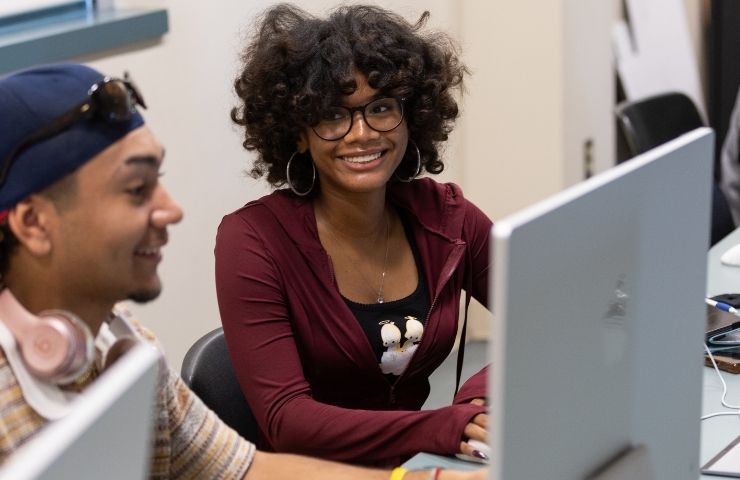
To view the Course Schedule by term, click here. See the Catalog of Courses for complete descriptions of course offerings.
For detailed curriculum information, please refer to the Academic Bulletin.
Visual Arts Faculty

Mariana Smith

Chung-Fan Chang


Michael McGarvey
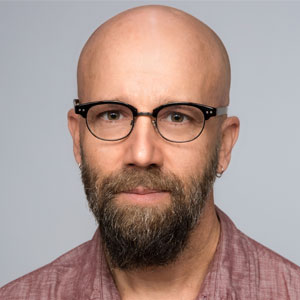
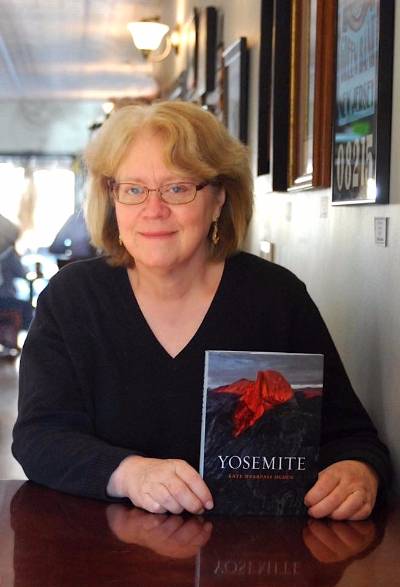
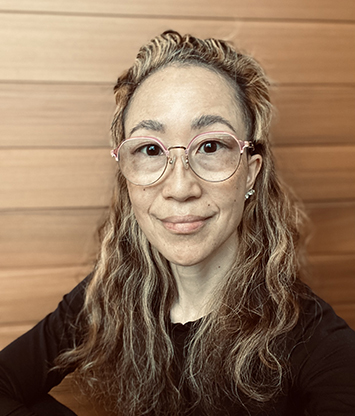
C. Hannah Ueno
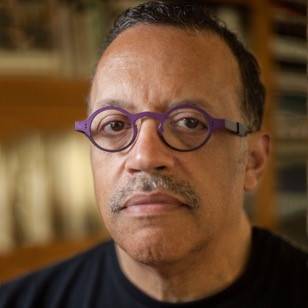
Wendel A. White
Visual Arts Staff


Adjunct Faculty

Michael Cagno

Ryann Casey


Dan Gambert





Emeritus Faculty


Alfonso Corpus
Special Opportunities
Students have access to studios for printmaking, painting, drawing, sculpture, graphic design and computer graphics, and a photographic darkroom. The Stockton University Art Gallery hosts a variety of exhibitions throughout the year, including work by graduating BFA students. The Visual Arts Program offers regular bus trips to New York City and Philadelphia.
Interested students have the option of participating in Design for Community Partners, a service-learning internship in which design students collaborate with not-for-profit community partners to solve visual communication problems for the benefit of the entire community. Students also have the opportunity to participate in internships with other companies, studios, and museums, including the Noyes Museum of Art of Stockton University.
The Art Club is an extracurricular organization, open to any Stockton student that engages in art-related creative and social activities. Activities have included field trips; figure drawing sessions, silk screening, button making, and the production of a colorful calendar featuring student artwork.
Facilities
Students have access to studios for printmaking, painting, sculpture, graphic design and computer graphics, and a photographic darkroom. A brand new Art Gallery hosts a variety of exhibitions throughout the year.
Careers
Additional Careers
This list is not exhaustive but it provides a solid idea of what fellow graduates have gone on to do and what potential careers a Visual Arts degree can offer. Some options are more directly associated with specific areas of Visual Arts than others.
- Architect
- Archivist
- Art Consultant
- Art Editor
- Art Gallery Director
- Artist
- Cartoonist
- Cinematographer
- Courtroom Sketch Artist
- Critic
- Curator
- Engraver
- Exhibit Designer
- Fashion Designer
- Furniture Designer
- Gallery Director
- Graphic Designer
- Historian
- Illustrator
- Interior Decorator
- Jewelry Designer
- Journalist
- Landscape Designer
- Medical Illustrator
- Multimedia Consultant
- Museum Director
- Non-profit Administrator
- Painter
- Performer
- Photographer
- Product Designer
- Sculptor
- Set Designer
- Special Effects Consultant
- Tattoo Artist
- Teacher
